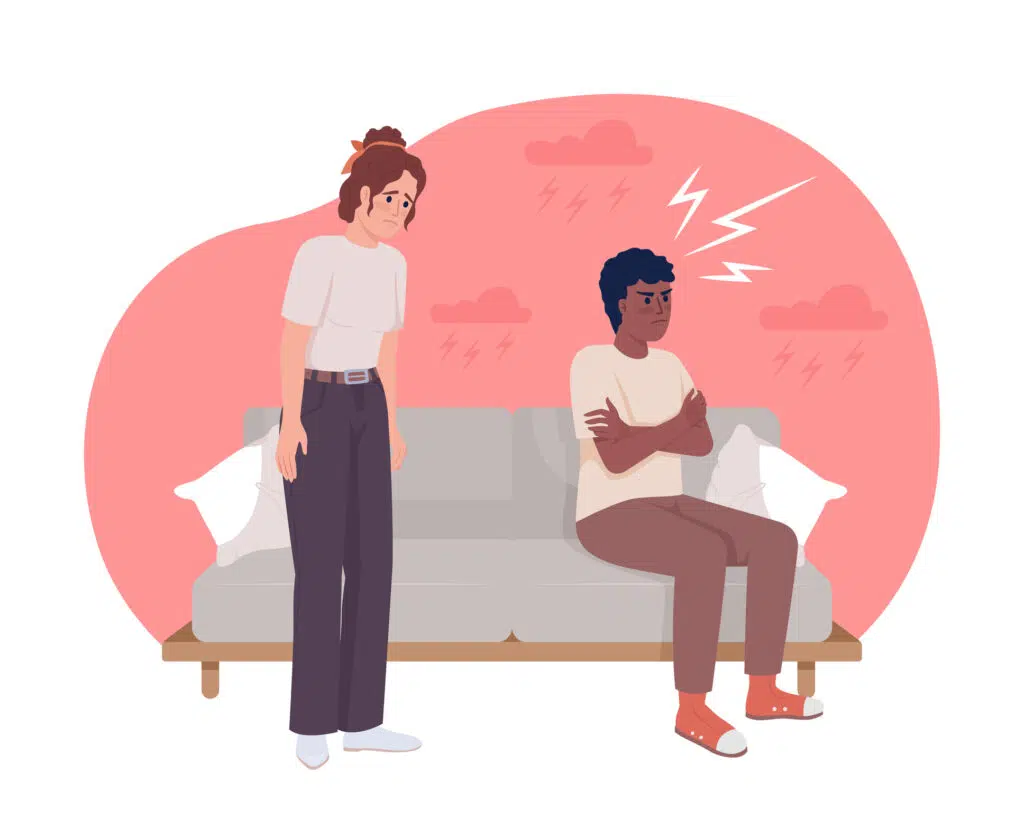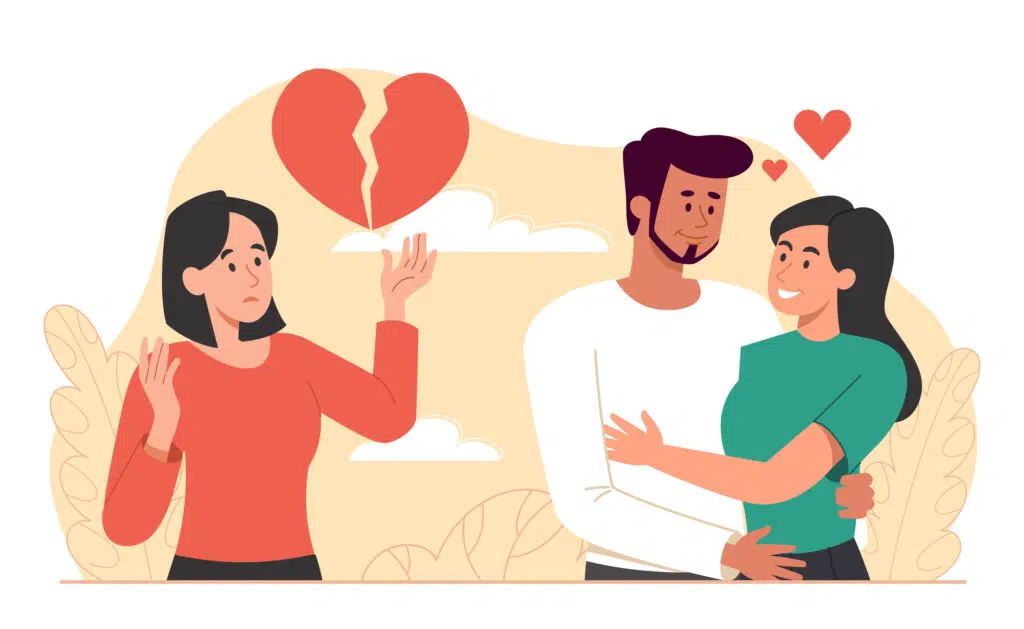5 Signs That You May Be in a Co-Dependent Relationship
You may have heard the term co-dependent a lot, but what does it actually mean? How do you know if you are in a co-dependent relationship, and is it really as damaging as people say? Healthy and loving relationships are based on support and partnership. If your relationship starts to impact your sense of self, or worse, it could be a sign that you may be in a co-dependent relationship.
What is a Co-Dependent Relationship?
In a typical sense, co-dependency is used in the case of substance abuse. One person abuses a substance and depends on another person to get the supply, money, or shelter. So, a person can be co-dependent where they look for something external to make themselves feel better.
In a relationship, two people can become so invested in each other that they lose themselves. They can struggle to function independently of one another. Things like happiness and mood become dependent on the other person. Generally, one person tends to be more passive, and the other dominant. Unfortunately, a person can become dependent on unhealthy relationships that are harmful. This is where it can be damaging.
Dr. Claire Nakajima, Psychologist Resident in New York City (NYC), explains further, “co-dependent relationships prevent the growth and well-being of both parties. If one person is always taking on responsibilities for the other or regulating the emotions of the other, they don’t get to pursue their own desires and happiness. This pattern also prevents the other person from learning to be responsible or how to manage their own emotions.”
5 Signs that You May Be in a Co-Dependent Relationship
By knowing the signs of a co-dependent relationship, you can identify harmful behaviors and seek help when you need it. It’s important to know that co-dependency can occur in any relationship, like parents, children, friends, or even colleagues. Here are some of the telltale warning signs of a co-dependent relationship.
- Relationship Feels One-Sided
In a co-dependent relationship, one person usually takes on the role of “the giver,” while the other is “the taker.” A healthy relationship involves mutual respect, love, and support where both parties benefit. A co-dependent relationship tends to be one-sided, where one person is putting in all the effort at the expense of their own well-being. In some cases, they may even “enable” the other person’s destructive behavior.
Dr. Claire Nakajima says one of the biggest signs of being in a co-dependent relationship is “if you find yourself consistently stifling your desires and needs for the benefit of another person or acting in a way that encourages the other person to become dependent on you.”
- Difficulty Making Decisions in the Relationship
The American Psychological Association (APA) defines co-dependency as “the state of being mutually reliant,” where two individuals feel emotionally dependent on each other. Usually, in a co-dependent relationship, one person is more passive. Often, this person finds it difficult not only to make decisions in the relationship but for themselves too. When you’re sacrificing yourself to make the other person happy, this can be very harmful over time.
- Unhealthy Dependence on the Relationship
Relationships are unique. Whether it’s a romantic partner, sibling, or parent, the way you interact and experience life together is unique. Sometimes, it’s difficult to identify when a relationship becomes unhealthy. If you find yourself having an unhealthy dependence on the relationship, this could be an issue. Perhaps you don’t think about your needs or constantly seek approval from the other person. You might even say that the situation isn’t that bad and start to doubt your own perspective.
Dr. Claire Nakajima says that “if you keep waiting for a change to take place, but the other person is consistently not responsive to your needs, but you remain in the relationship without respected boundaries,” it could be a sign of an unhealthy dependence on the relationship.
- Poor Self-Esteem
Another sign of co-dependency in a relationship is poor self-esteem. In general, neither person in this type of relationship has great self-esteem. But when your self-esteem depends on bringing value to another person, it can hugely impact how you feel about yourself. When you lack trust in yourself and views, your self-esteem can suffer massively.
Signs of low self-esteem include:
- Negative self-talk
- Worry and fear of failure
- Social withdrawal
- Difficulty expressing your needs
- Trouble saying no and setting boundaries
- Stress in the Relationship
It’s entirely normal to go through conflict in a relationship or to experience stress. Life transitions, financial disagreements, work, and family commitments, can all be stressful. If you’re experiencing relationship issues or stress, it’s not necessarily a huge red flag. But when you struggle to communicate or respect boundaries in a relationship, it can create stress and relationship problems. If a person feels like they have to get everything right with no room for error, or both parties are extremely afraid to be alone, it can create hostility. While there may not be full-blown fights regularly, as typically one person is dedicated to making the other happy, it’s still a stressful environment.
Another potential red flag is “if you feel that your relationship with a person shields them from taking accountability and responsibility for important things or you attempt to control another person rather than allowing them to learn from their own missteps with your support,” says Dr. Claire Nakajima. Again, when a relationship impacts the growth and well-being of one or both people, it could be time to reflect.
How to Determine if You’re in a Co-Dependent Relationship
Many relationships have traits of co-dependency. That doesn’t mean that your relationship is necessarily doomed to fail. A healthy relationship can have elements of co-dependency. The most important thing is identifying these elements and learning to move forward more healthily. Knowing you’re in a co-dependent relationship is one thing; the next stage is to make real changes toward a healthier and supportive relationship.
The first stage of overcoming a co-dependent relationship is trying to figure out if you’re in one. Dr. Claire Nakajima recommends that “if you know you’re in a co-dependent relationship and feel like you’re ready to make changes within it, assess what you would like to change and the other person’s willingness to change. If you’re unsure if you’re in a co-dependent relationship or think you may be and are unsure what to do next, begin by reflecting on the relationship.”
When trying to find out if you’re in a co-dependent relationship, try asking yourself the following questions:
- Do you make excuses for the other person?
- Do you always put their needs before yours?
- Do you find it difficult to say no to your partner?
- What is keeping you in the relationship?
- Are you afraid to leave or be alone?
One way to explore these questions is through individual or couples therapy. A therapist can help you understand why you’re in a relationship and help you figure out your own narrative more. Dr. Claire Nakajima says that “until you determine what those reasons for being in the relationship are, co-dependent relationships can be very difficult to change or leave.”
Overcoming a Co-Dependent Relationship
So, can you overcome and save a co-dependent relationship?
“I think that a co-dependent relationship can be saved if and only if both parties are willing to examine and make changes. If one person is not willing to change, it will be difficult for the other person to shift the dynamics by themselves, and they might be better off leaving the relationship if possible or spending less time together,” says Dr. Claire Nakajima.
Whether you can overcome a co-dependent relationship depends on the people in the relationship and their unique situation. If you find that you feed off relationships that are unhealthy, it could be a sign that you may benefit from speaking to a therapist or psychologist.
You don’t need to go through this alone. If you or someone you love is struggling with a co-dependent relationship, the Thriving Center of Psychology can help. Our team of experts can help create a safe and nurturing space to support you. Whether you wish to overcome co-dependency and move forward in your relationship or work on your own well-being, we can help to navigate negative emotions so that you can better understand yourself. Contact one of our offices in New York, California, Florida, Minnesota, Oregon, or New Jersey, or schedule an appointment online. You can book both in-person as well as online video therapy sessions.

How to Move On After a Friendship Breakup
Friendship breakups can sting just as much as a romantic breakup. After all, you’re experiencing a loss of shared history and an understanding of each other that can leave you feeling lonely and isolated. Not all friendships are forever, but moving on from the loss of a friendship does take time and some self-compassion.

Signs You’re in a Toxic Relationship
A toxic relationship can chip away at your well-being and happiness. Toxic partners can be manipulative and charming, making it difficult to recognize the signs that you’re in a toxic relationship. You deserve to be in a supportive and healthy relationship.

10 Common Marriage Reconciliation Mistakes to Avoid After Infidelity
Infidelity can leave couples devastated. If you’ve been affected by infidelity and want to salvage your relationship, rebuild trust, or make a tough decision, keep reading for 10 common reconciliation mistakes to avoid after infidelity.

Survey: 72% of Americans are Stressing About the Upcoming Presidential Election
Political viewpoints in the U.S. have always been contentious, but is the impact of politics in the United States making it difficult for people to live their everyday lives? With some anticipating another brutal and long campaign season ahead of the upcoming 2024 presidential election, nearly half of Americans say politics is negatively impacting their mental health.




